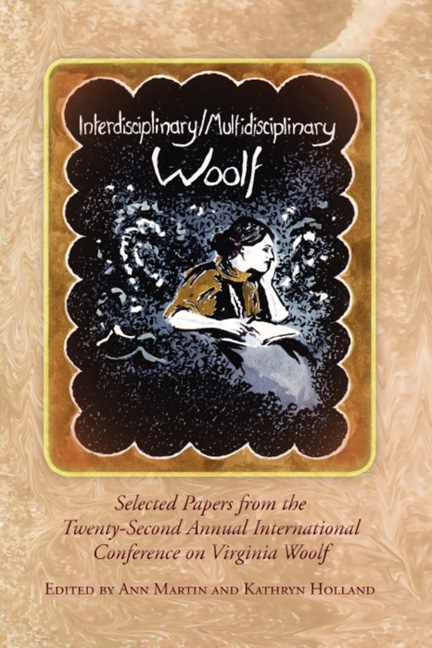Book contents
- Frontmatter
- Contents
- Introduction to Interdisciplinary/Multidisciplinary Woolf
- Acknowledgments
- List of Abbreviations
- History, Materiality, Multiplicity
- Multidisciplinary Woolf / Multiple Woolfs?
- Woolf, History, Us
- “Full of Experiments and Reforms”: Virginia Woolf, John Maynard Keynes, and the Impossibility of Economic Modeling
- Desiring Statues and Ambiguous Sexualities in Jacob's Room
- Challenging the Family Script: Woolf, the Stephen Family, and Victorian Evangelical Theology
- History as Scaffolding: Woolf's Use of The Times in The Years
- Vincent van Gogh, Virginia Woolf, and Old Shoes: A Cross-Cultural Iconography of Historical Truama from the Great War to the Iraq War
- Stopped at the Border: Virginia Woolf and the Criminalization of Dissent in Democratic Societies
- “Q. And babies? A. And babies”: On Pacifism, Visual Truama, and the Body Heap
- Photography, History, and Memoir of the Spanish Civil War: Interdisciplinary Views
- Patterns, Practices, Principles
- Art, Influence, Embodiment
- Publishing, Politics, Publics
- Notes on Contributors
- Conference Program
“Full of Experiments and Reforms”: Virginia Woolf, John Maynard Keynes, and the Impossibility of Economic Modeling
from History, Materiality, Multiplicity
- Frontmatter
- Contents
- Introduction to Interdisciplinary/Multidisciplinary Woolf
- Acknowledgments
- List of Abbreviations
- History, Materiality, Multiplicity
- Multidisciplinary Woolf / Multiple Woolfs?
- Woolf, History, Us
- “Full of Experiments and Reforms”: Virginia Woolf, John Maynard Keynes, and the Impossibility of Economic Modeling
- Desiring Statues and Ambiguous Sexualities in Jacob's Room
- Challenging the Family Script: Woolf, the Stephen Family, and Victorian Evangelical Theology
- History as Scaffolding: Woolf's Use of The Times in The Years
- Vincent van Gogh, Virginia Woolf, and Old Shoes: A Cross-Cultural Iconography of Historical Truama from the Great War to the Iraq War
- Stopped at the Border: Virginia Woolf and the Criminalization of Dissent in Democratic Societies
- “Q. And babies? A. And babies”: On Pacifism, Visual Truama, and the Body Heap
- Photography, History, and Memoir of the Spanish Civil War: Interdisciplinary Views
- Patterns, Practices, Principles
- Art, Influence, Embodiment
- Publishing, Politics, Publics
- Notes on Contributors
- Conference Program
Summary
Much of Bloomsbury's fiction takes economics as a central concern—for example, Virginia Woolf's Night and Day and The Years, as well as E. M. Forster's Howards End and A Passage to India, and Leonard Woolf's early anti-imperialist novel The Village in the Jungle. This is even more characteristic of Bloomsbury's essays and polemics, including Virginia Woolf's A Room of One's Own and Three Guineas. Mutually influencing each other in the multidisciplinary context of Bloomsbury, Keynes and Virginia Woolf—as well as Leonard Woolf and E. M. Forster—all, in varying ways, conceive of economic goals not as ends in themselves but as a basis for the production of art and the achievement of the good life. They work toward these aims by using a method of inquiry that, because it acknowledges uncertainty, is experimental and iterative, and yet paradoxically more accurate in representing the empirical conditions of the “real world” than overly reductionist neoclassical precision can yield.
Scholars of intellectual history have established a linkage between Keynesian macroeconomics and Bloomsbury's philosophy, tracing influences on Keynes from G.E. Moore to Ludwig Wittgenstein. I argue for a further linkage among these two disciplines and Bloomsbury's literature. Why, and to what effect, as Virginia Woolf reflects upon the interplay of economics and literature, does she repeatedly foreground contradiction, complexity, and irreducible vagueness? Woolf's insistence upon acknowledging complexity constitutes useful and realistic exploration, mostly avoiding too-easy, and potentially erroneous, fixed certainties about what is necessary to achieve a fully engaged and sustainable artistic life. Woolf experiments with possibilities, some pragmatic and some impossibly utopian, to optimize her “model” for the woman artist of her own class in particular, but also with potentially more general applicability, in a changing modern England.
An essential piece of this puzzle relates to language, vagueness, and the acknowledgment of uncertainty in all of Woolf's attempts at economic modeling. This characteristic is also crucial in Keynes's development of the General Theory, as he moves from courting what he calls a kind of “grey” and “fuzzy” indeterminacy (Keynes's Lectures 100-101), deliberately welcoming open dialogue and debate from others in his field, to crafting a mature and more concretely realized—but never fully fixed—empirical and theoretical model of the modern macroeconomy.
Information
- Type
- Chapter
- Information
- Interdisciplinary/Multidisciplinary Woolf , pp. 20 - 26Publisher: Liverpool University PressPrint publication year: 2013
